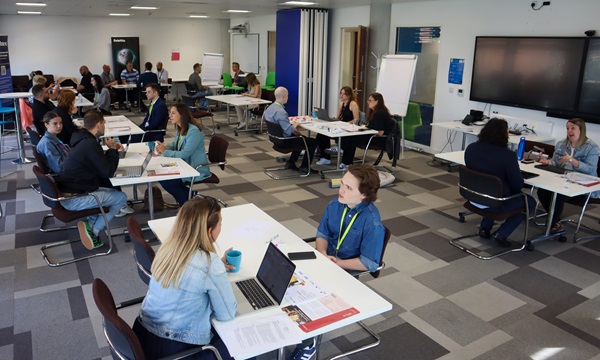As the leading voice for fintech in Wales, FinTech Wales is committed to empowering fintech organisations and professionals to drive success. Central to this mission is collaboration, which underpins all of FinTech Wales’ efforts to nurture Skills & Talent—one of its four key strategic pillars—ensuring the future of fintech is secured through cooperative efforts across education, industry, and government.
Wales boasts a vibrant fintech ecosystem, supported by leading colleges, universities, and work-based learning providers. These institutions play a crucial role in cultivating the talent necessary to drive growth in the sector. FinTech Wales acts as a facilitator, fostering critical collaborations between educators and employers, creating pathways for placements, graduate programmes, and apprenticeships that directly impact the talent pipeline.
Education providers make a significant contribution towards the FinTech Wales membership such as Cardiff University, The Open University, Swansea University, ALS Training, Cardiff and Vale College, Code institute as well as Future Finance.
Attracting future talent
There was a 10% rise in applications to computing degrees in Wales, according to a 2023 Stats Wales report. This growth is part of a broader trend in the UK, driven by the increasing demand for skills in emerging technologies such as AI and cybersecurity.
While this growing interest in tech-related skills is promising, early exposure to the fintech sector is still vital to attract top talent into the industry. Initiatives such as internship and mentorship programmes can help by allowing students to engage with fintech problems before they graduate.
Some fintechs are taking a proactive approach to talent development by offering ongoing graduate programmes and apprenticeship opportunities, which have proven successful as part of their long-term strategies.
In 2023 de Novo Solutions, headquartered in Langstone, collaborated with the University of South Wales to launch an innovative Degree Apprenticeship Scheme.
“We believe that as part of our growth and development over the coming years – particularly in South Wales – it’s important to aid the training and development of young, aspiring tech professionals within the local community, who will not only gain valuable insight into the tech sector from our senior leadership team but will also have the opportunity to make a real difference in building the de Novo brand; all while obtaining a valuable university degree,” said Mark Sweeny, Founder & Chief Executive of de Novo Solutions.
Connecting talent with employers
Outside traditional educational pathways, coding academies and bootcamps are making significant strides in equipping individuals with the skills needed to transition into fintech roles. These programmes offer practical, accelerated training, and we’ve seen promising outcomes, with many graduates securing roles in tech within weeks of completing their certifications. However, challenges remain, as not all graduates find suitable job opportunities right away.
FinTech Wales addresses this gap through partnerships with training providers. Initiatives such as Speed Interview Day with Cardiff and Vale College and Recruitment Day with the University of South Wales offer a direct platform for talent to connect with employers. These events facilitate meaningful conversations, bridging the gap between skilled graduates and the companies eager to meet them.
Dan Hughes, Senior Tutor Practitioner at iungo Solutions, who completed the FinTech Wales Advance Data Academy in 2022, said: “Participating in the FinTech Wales Speed Interview Day was a fantastic experience. It allowed me to connect directly with employers right at the end of the academy. The opportunity to showcase my skills in a supportive, fast-paced environment was invaluable.”

Upskilling the workforce
Upskilling is another area where collaboration is vital. For fintech companies, prioritising workforce upskilling in key areas is vital to stay competitive and adapt to rapid technological changes. AI presents both a challenge and an opportunity, requiring coordinated efforts between training providers, employers, and the government. A recent survey revealed that 56% of businesses in Wales lack confidence in their knowledge of artificial intelligence (AI), which is lower than the national average in the UK, where 62% of employers feel similarly.
FinTech Wales has been at the forefront of hosting collaborative AI events in 2024 with its members such as Ogi, Lewis Silkin, Menna and Peppercorn.ai, covering integration, regulation, ethics, and fraud prevention. These events provide a platform for industry experts, educators, and policymakers to share insights and strategies, ensuring that upskilling initiatives remain relevant and aligned with business needs.
The future of fintech in Wales relies on sustained collaboration between all stakeholders—educators, employers, and government bodies. FinTech Wales remains at the heart of these efforts, facilitating partnerships that foster the development of a skilled and adaptable workforce. By prioritising cooperation across sectors, FinTech Wales is ensuring that the talent pipeline continues to flourish, positioning Wales as a leader in fintech innovation for years to come.
